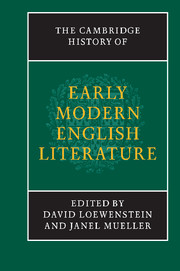Book contents
- Frontmatter
- Introduction
- 1 Modes and means of literary production, circulation and reception
- 2 The Tudor era from the Reformation to Elizabeth I
- 3 The era of Elizabeth and James VI
- 4 The earlier Stuart era
- 15 Literature and national identity
- 16 Literature and the court
- 17 Literature and the church
- 18 Literature and London
- 19 Literature and the theatre to 1660
- 20 Literature and the household
- 5 The Civil War and Commonwealth era
- Chronological outline of historical events and texts in Britain, 1528–1674, with list of selected manuscripts
- Select bibliography (primary and secondary sources)
- Index
- References
17 - Literature and the church
from 4 - The earlier Stuart era
Published online by Cambridge University Press: 28 March 2008
- Frontmatter
- Introduction
- 1 Modes and means of literary production, circulation and reception
- 2 The Tudor era from the Reformation to Elizabeth I
- 3 The era of Elizabeth and James VI
- 4 The earlier Stuart era
- 15 Literature and national identity
- 16 Literature and the court
- 17 Literature and the church
- 18 Literature and London
- 19 Literature and the theatre to 1660
- 20 Literature and the household
- 5 The Civil War and Commonwealth era
- Chronological outline of historical events and texts in Britain, 1528–1674, with list of selected manuscripts
- Select bibliography (primary and secondary sources)
- Index
- References
Summary
The early Stuart era begins with the 1604 disputation between the bishops’ party and the Puritans at Hampton Court and it ends thirty-seven years later in a civil war between much the same two groups, although over far more complicated issues. Throughout the period one finds religious tensions and conflicts, many with a marked political dimension. Early Stuart controversial divinity centres on issues of authority, jurisdiction, power, obedience, conformity and outward worship. The religious controversies respond to and are inseparably intertwined with the ecclesio-political crises of the age: the Gunpowder Plot of 1605 and the subsequent imposition of the Oath of Allegiance; the outbreak of the Thirty Years’ War in 1618; the dissolution of the 1629 Parliament that ushered in Charles’s eleven-year Personal Rule; the Bishops’ Wars of 1639–40; the English Civil War.
These crises spawned an immense corpus of religious polemic, including a fair amount of hate literature and the anti-Catholic, anti-Laudian conspiratorial fantasies that seem to have been largely responsible for the breakdown of Caroline rule. Yet these polemics also include Donne’s witty and searching anti-Jesuit satire, Ignatius his Conclave (1611); the providential, almost mystical, nationalism of Lancelot Andrewes’s Gunpowder Plot sermons, which, in their fusion of English Protestant triumphalism with radiant evocations of sacral monarchy and a deep abhorrence of religious persecution, gave expression to the ideals at the heart of James’s own pacifist and absolutist Christian politics; and William Chillingworth’s brilliant Religion of Protestants (1638), published only a few months after Descartes’s Discourse on Method (1637), which radicalised theology via the same epistemic turn that Cartesianism gave to philosophy: a summa theologiae that treats not the objects of belief but the act of believing.
- Type
- Chapter
- Information
- The Cambridge History of Early Modern English Literature , pp. 512 - 543Publisher: Cambridge University PressPrint publication year: 2003

